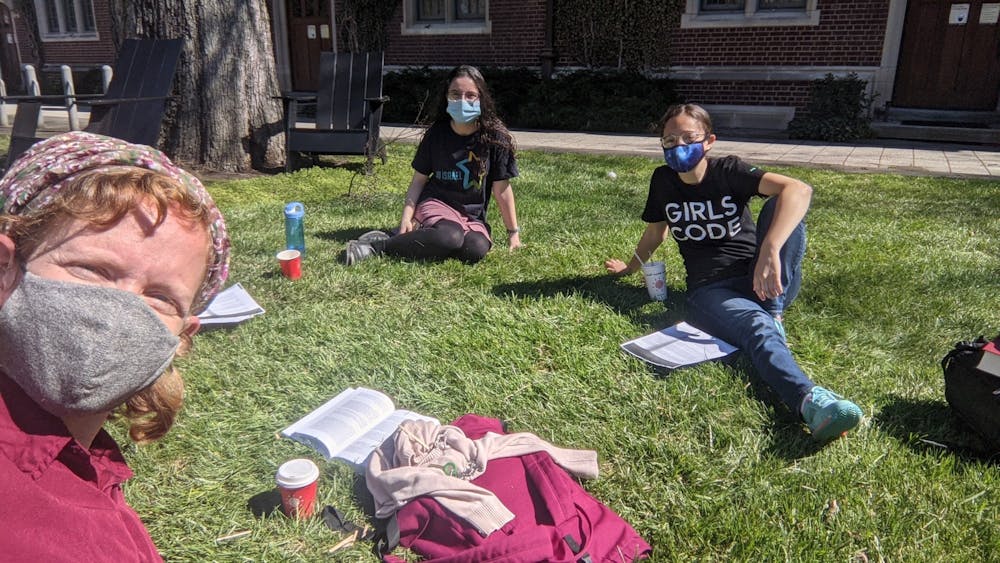On April 9, students sat down under canopies outside the Center for Jewish Life (CJL) for the community’s first outdoor Shabbat, a world away from the weekly Zoom Shabbats of the previous spring.
Adapting to the pandemic online stretched all of Princeton’s academic, social, and religious communities, and Princeton’s Jewish community faced its own unique set of challenges. From keeping kosher in quarantine to adapting traditions that require the physical presence of others, the CJL and its student leaders had to adjust how they supported the Jewish community on campus and how they approached building this community in the first place.
Executive Director of the CJL and Jewish Chaplain Rabbi Julie Roth broke down the “constant pivoting” and “constant experimentation” of the last year.
“We are proud to have one of the strongest Hillels in the whole world, so, Shabbat dinner, 150-300 students every Friday night. That was something that we worked to make strong every week, every year,” Roth said in a spring interview with The Daily Princetonian.
“But what do you do when only eleven people can fit in the dining hall? What do you do when nobody’s on campus?” she continued.
This past semester, the CJL was able to create opportunities for sharing community in person in addition to online programming that started in the summer of 2020. Jewish students connected by praying together, by dining in the CJL, and by celebrating holidays — socially distanced, of course.
“For the daily prayer there are certain things that you can only say if you have an in person congregation; you can’t do it over Zoom,” explained Shira Kahn, a Co-Director and Educator of the Jewish Learning Initiative and CJL affiliate. Even masked and six feet apart, in-person prayer is something she feels “very grateful to have.”
Andrew Arking ’22 echoed this gratitude. “With this incredible amount of Zoom fatigue it’s nice to have a community that’s built around in-person interaction: going to services in the same place, and eating meals at adjacent tables in the same dining hall,” he told the ‘Prince.’

Hadar Halivni ’22 agreed. “At least for me the pandemic has increased my desire to be part of a community, and I’m sure it’s the same for many other people,” she noted.
Even so, the in-person traditions the students were grateful for required some creative thinking — especially around the holidays.
In the spring of 2021, the eight-day celebration of Passover finished on April 4. For members of Princeton’s Jewish community, it was the second Passover to take place online.
Kahn explained that for many Orthodox and traditionally observant Jews, the practice of not using electronics on holidays or Shabbat left many people celebrating the holiday alone, without the option of Zoom or phone calls.

Arking agreed that this year was a “completely different experience,” highlighting the challenge of spending Passover apart from family. He and many others found value in celebrating with friends.
“Passover brings out a lot of our different family traditions and each person at our passover seder talked about some of their family’s customs and brought ideas that they would share at their family Passover table … It really felt like we were each able to give the other people a piece of home,” Arking said.
Online programming also facilitated reaching out to members of the broader Jewish community for Holocaust memorial day, which took place on April 8.
“Every year there was something in the CJL, but now that we do it on Zoom, a lot more people can participate than usual,” Kahn shared. “So we have alumni and community members involved, so the spread of the communal events is much broader than it could’ve been and maybe meets the needs of people that always had needs but now they actually have a platform for them.”
Among those who collaborated to create virtual space were Zev Mishell ’22 and Rabbi Roth. In particular, they worked with Hillel International and other members of the local Jewish community to create High Holy Day services that could be observed even by those who couldn’t attend in person.
Mishell took over as President of the group representing Conservative Judaism, Koach, in January 2020, pre-pandemic, while students were still on campus.
Mishell began the semester with certain goals and hopes, such as adding a volunteer and a social justice component. “I’d wanted to create a religiously vibrant space, a place that felt openly and actively warm and comfortable for a variety of people,” he explained.
The onset of the pandemic in March brought new challenges to his role.
“I realized that everyone was just going into their own worlds, and so [for me and the rest of the board] it was this really active process of thinking ‘what are people looking for,’ what is the community they want,” Mishell remembered. Instead of taking a break, as they normally would, Koach continued meeting over the summer.
For Mishell, religion plays an important role in helping observant individuals understand themselves and their paths in life.
“I think that religion gives you a space to have that growth and to have those experiences, in communal settings and in ways that reach really deeply into who you are,” Mishell said. “And that calls out something in you that can be shared and praised or sung or celebrated together.”
Several student leaders, including Halivni and Arking, highlighted the importance of the students themselves in building spaces for Jewish life on campus.
Arking especially praised the Class of 2024 for how enthusiastically they have contributed to Princeton’s Jewish community. He agreed with Halivni on how the pandemic influenced their experiences.
“Everyone has really stepped up this year and the upperclassmen have made an effort to really integrate the first years in, because they’re able to give more time to the community,” he said.
For Rabbi Roth, the connections between faith and what community can offer were just as clear. “I believe life is a sacred gift, and that Judaism is a road map for living life as a sacred gift, and I really believe I was born into this world to help people make their lives more meaningful,” she said.
“That’s something I feel so strongly really transcends whether we’re in a pandemic or not, and so I felt, how can we continue our work of community building and relationship building and meaning making and learning,” Rabbi Roth continued.
Similarly, Mishell felt that the meaning he draws from Judaism and his family’s past granted him important perspective and context for the many pandemic-induced challenges.
“My grandparents survived the Holocaust. They had always experienced antisemitism when they were in Europe. They had this difficult and struggling experience in America to become middle class and to establish themselves here: learning a new language, not fitting into the culture — all of that — dealing with their trauma,” Mishell said.
Mishell applied this thinking to the pandemic. “I felt like in the pandemic, because there is this tradition of Jewish memory of things go wrong and you deal with it and we stretch ourselves and we still stay together and do community together. We don't give up.”
As the year online came to an end and student vaccinations became more readily available, another international event stretched the Jewish community on campus.
In finals week of the 2021 spring semester, the Israeli-Palestinian conflict escalated into violence, and eleven days of conflict ended with a ceasefire on May 21. Kahn described how this affected Jewish students on three levels: the personal, the communal, and finally the ideological, with the rise in antisemitic attacks across the country.
On the personal level, some community members experienced the conflict first-hand.
“Many students that are in Israel right now ... were suddenly running to bomb shelters,” Kahn said. “I know that most people have never experienced a siren from rockets, but it’s terrifying.”
Kahn described how the violence also brought up many larger, complex questions for the Jewish community.
“On the communal level, Israel is a place that we relate to and connect to…. and to have Israel on the front lines is not an easy experience,” Kahn said. “Then came the question of, as a Jewish community, how do we respond to this? How do we show support, and how do we address the complexity?”
As Jewish students grappled with these questions, they expressed a variety of opinions. In the Prince’s coverage alone, some students supported Israel’s right to defend itself from bombing from Hamas, while others questioned the Israeli military’s tactics and broader actions in the West Bank and Gaza Strip.
Kahn stressed the diversity of opinions within the Jewish community on the conflict but expressed concern over how some sentiments toward Israel during the conflict fueled antisemitism.
Members of Yavneh, the University’s Orthodox Jewish student group, were harassed while praying on the CJL lawn in May, with slurs shouted at the students according to reporting from the Tory. A student was also harassed while walking near campus during Commencement for wearing a kippah. In both cases, the students were reportedly accused of hostility toward Palestinians.
“What started as an Israel-based conflict very quickly escalated into antisemitic events … that various students on campus experienced in antisemitic expressions towards them just for being Jewish — without knowing what their positions on Israel were,” Kahn said.
In a statement, CJL leaders condemned these incidents, as well as exchanges on residential college listservs involving the conflict that “have sometimes moved beyond political disagreement to antisemitism.”
University President Christopher Eisgruber ’83 also condemned the on-campus incidents.
“Sharp, intense, and provocative disagreement about Israel and Palestine is fully consistent with the debate that must occur on college campuses,” Eisgruber wrote. “Harassment, heckling, stereotyping, and intimidation are not.”
Kahn said the Jewish community came together following these incidents. According to their statement, the CJL supported students in a number of ways — from engaging in one-on-one conversations with concerned students to connecting with peer Hillels around the country.
The Jewish community — including the Orthodox, Conservative, and Reform groups — also came together in a virtual prayer service.
“This is something that doesn’t happen often — usually the prayer spaces are separate,” Kahn reflected. “It was very simple; [all three groups] got together and prayed for peace and safety.”








